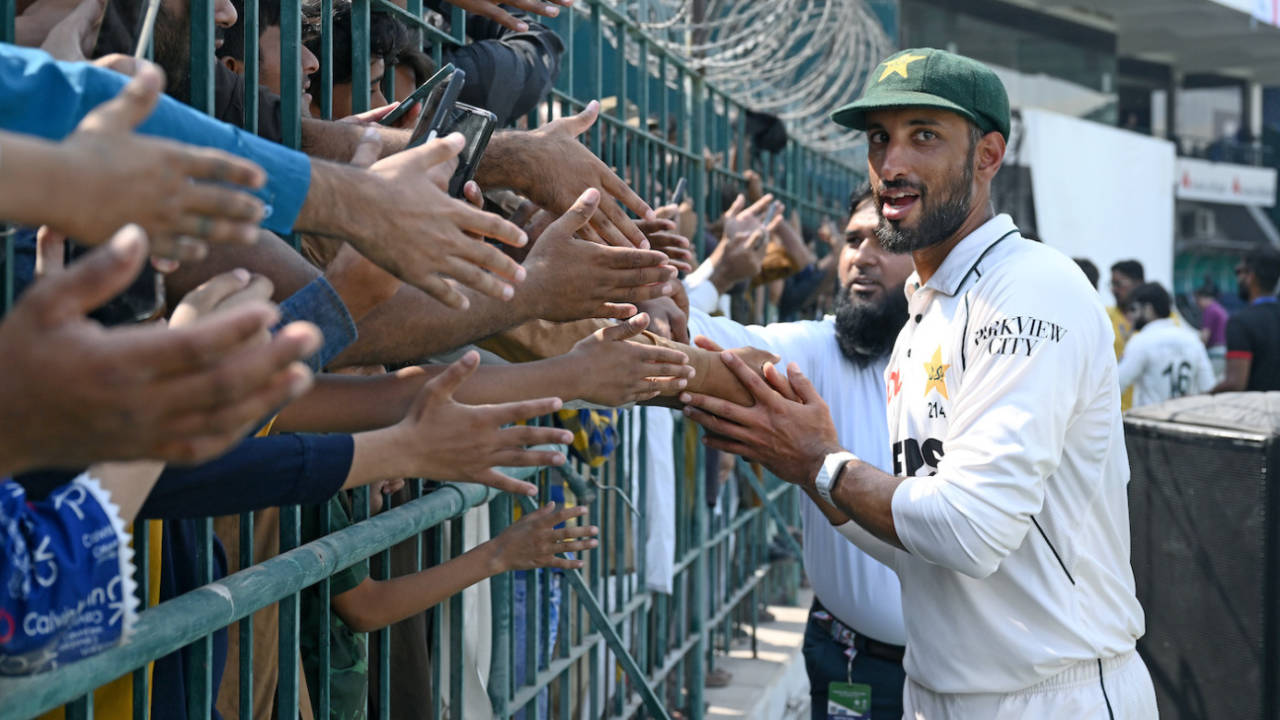Pakistan captain relieved after change in tactics helps bring end to barren home run
Shan Masood greets the fans across the railings after Pakistan’s win • Getty Images
Not quite vindication just yet, but certainly relief. That was the tone Pakistan captain Shan Masood tried to strike after Pakistan had skittled England out for 144 in Multan. It gave them their first home win in four years, and on a personal note, Masood his first Test win as captain.
“This was a very important win for Pakistan cricket,” he said. “The recent results were unacceptable. There is relief. This is a long process and journey. It won’t be fixed overnight. It’s been three years and 10 months since we last won a Test at home. That’s not acceptable for Pakistan cricket. We pride ourselves on how well we play this game and how we see ourselves as a team. For us to get a result and hopefully start something here in our own conditions is exciting. Going through that adverse situation for years and still getting a result: that’s the character you want from your players, staff and cricket board. Everyone’s responded well after the [first Test] loss which is very heartening.”
Following an innings defeat that intensified focus on Masood’s captaincy and a seemingly endless losing streak, the newly established selection committee overhauled Pakistan’s template overnight. Fast bowlers Shaheen Afridi and Naseem Shah were dispatched from the squad, and Zahid Mahmood, Sajid Khan and Noman Ali were brought in from the cold – none of them having played any first-class cricket since January. The same pitch as the first Test was recycled and reused.
Masood, though, said Pakistan had not changed their line of thinking on the one subject that really mattered. “I said that in defeat, and I’ll say it in victory: 20 wickets is non-negotiable in Test matches,” he said. “Conditions in the 4th innings are only batting-friendly about 10% of the time. We have to understand our conditions and think first about what combinations get us 20 wickets. We need big first innings with the bat and then the bowlers to back us up to give us a lead. The lead took the third-innings pressure off us, and the 75-run lead helped us because where we scored 220-odd [that] resulted in a nearly 300-run target.”
Masood acknowledged the central gamble at the heart of Pakistan’s winning tactic this week though. Perhaps the most important act of the game was the flip of the coin before the first ball was bowled. Ben Stokes called tails, as he always does, and when the coin pointed the other way, the gambit had paid off.
The rest was taken care of by two of the spinners they brought in, with Sajid and Noman splitting all 20 wickets between them – the first time two players have been responsible for all opposition wickets since 1972, and just the second time in Pakistan’s history. In the second innings, no other bowler even turned their arm over as England were wrapped up in 33.3 overs.
“Today, we were solely focused on how to take eight wickets,” Masood said. “Since I’ve come in, we’ve had no issue taking risks. We’ve tried to play cricket that brings results, and we’ve lost a lot of matches doing that, too. When the selection committee came in, all of us had one concern: to take 20 wickets. We’d only taken 20 wickets once in my tenure. We looked at conditions and realised playing on a used surface and giving spinners an advantage [could work]. We thought why not try something different.
“You’ll have to give credit to Noman and Sajid, the way they came back. It looked like two seasoned campaigners were bowling for Pakistan. These risks need to be taken to try and take 20 wickets, no matter what kind of pitch we do it on.”
It’s been a familiar refrain for Masood this series, one where the result has justified the somewhat extreme methods Pakistan adopted. This is, as he pointed out, just the second time in seven Test matches under his captaincy that Pakistan have managed to take 20 wickets. He said Pakistan would be guided by the most efficient route from hereon, no matter how.
It is a subtle departure from the message of belligerent positivity that Masood has preached for the best part of his stint, but at some point, idealism had to be abandoned at the altar of pragmatism. It leaves the question of what Pakistan do in Rawalpindi, a surface that has never been amenable to prodigious turn. And though Masood did say Pakistan would need to understand conditions at each specific venue, there was little attempt to conceal what Pakistan really wanted from the pitch for the third Test.
“I would [like it to spin]. I don’t know if I’ve seen it turn in Rawalpindi, so that’s an issue. We’re hoping the sun can play its part and the wicket can be on the drier side. But it remains to be seen. We’ll go there on [Sunday] and have a look. The groundsmen are already there and working on a Test match pitch. We’ll try to create a good Test wicket where both teams can pick up 20 wickets.”
Danyal Rasool is ESPNcricinfo’s Pakistan correspondent. @Danny61000



